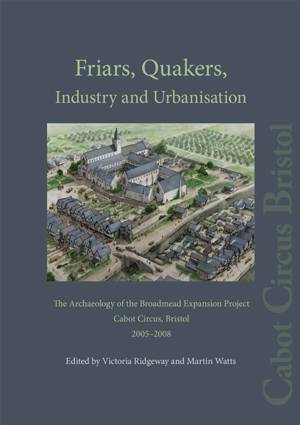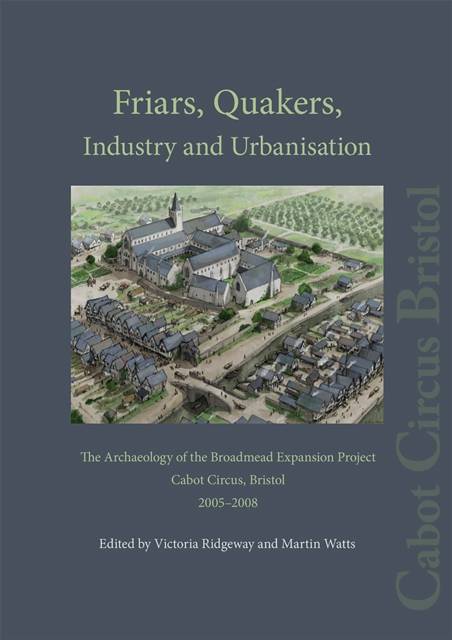
Bedankt voor het vertrouwen het afgelopen jaar! Om jou te bedanken bieden we GRATIS verzending (in België) aan op alles gedurende de hele maand januari.
- Afhalen na 1 uur in een winkel met voorraad
- In januari gratis thuislevering in België
- Ruim aanbod met 7 miljoen producten
Bedankt voor het vertrouwen het afgelopen jaar! Om jou te bedanken bieden we GRATIS verzending (in België) aan op alles gedurende de hele maand januari.
- Afhalen na 1 uur in een winkel met voorraad
- In januari gratis thuislevering in België
- Ruim aanbod met 7 miljoen producten
Zoeken
Friars, Quakers, Industry and Urbanisation
The Archaeology of the Broadmead Expansion Project, Cabot Circus, Bristol, 2005-2008
€ 47,45
+ 94 punten
Omschrijving
The development of Cabot Circus shopping centre presented a rare opportunity for the archaeological investigation of a large part of the Broadmead suburb of Bristol. The former presence of a Dominican Friary and later Friends' Meeting House were already well known, and surviving buildings from both remain within a large open piazza in the west of the new development. Further elements of the friary complex, including remains of the church and two cloisters, were revealed in various archaeological interventions within the area of the former precinct, enabling a reconstruction of the precinct and its environs to be made.
The project has also shed light on other aspects of the suburb's past that were previously less well known. Borehole investigations have allowed the prehistoric environment of the River Frome valley to be characterised, with episodes of small-scale tree clearance from the surrounding slopes during the later Neolithic and early Bronze Age, and the floodplain remaining as mud flats until the development of the Broadmead suburb in the 12th century and the arrival of the Dominicans in the 13th century. River access and the presence of flowing water were important assets for the industrial medieval and later suburb, which was home to tanning, leatherworking, ironworking and cloth industries. The Dissolution saw the demolition of parts of the friary, and by the later 17th century the surviving claustral buildings were occupied by trade guilds and the Quakers had built their first Meeting House.
The 18th and 19th centuries were times of enormous expansion for Bristol, when large-scale development occurred, expanding the suburb to the north and east of the former friary. These new developments included industrial premises, saw mills, cabinet works and malthouses, alongside terraces and courts of domestic dwellings. The recovery of a significant assemblage of tobacco pipe bowls and kiln wasters has enabled the development of new typology for Bristol, which should prove invaluable in dating future assemblages recovered from the city.
The project has also shed light on other aspects of the suburb's past that were previously less well known. Borehole investigations have allowed the prehistoric environment of the River Frome valley to be characterised, with episodes of small-scale tree clearance from the surrounding slopes during the later Neolithic and early Bronze Age, and the floodplain remaining as mud flats until the development of the Broadmead suburb in the 12th century and the arrival of the Dominicans in the 13th century. River access and the presence of flowing water were important assets for the industrial medieval and later suburb, which was home to tanning, leatherworking, ironworking and cloth industries. The Dissolution saw the demolition of parts of the friary, and by the later 17th century the surviving claustral buildings were occupied by trade guilds and the Quakers had built their first Meeting House.
The 18th and 19th centuries were times of enormous expansion for Bristol, when large-scale development occurred, expanding the suburb to the north and east of the former friary. These new developments included industrial premises, saw mills, cabinet works and malthouses, alongside terraces and courts of domestic dwellings. The recovery of a significant assemblage of tobacco pipe bowls and kiln wasters has enabled the development of new typology for Bristol, which should prove invaluable in dating future assemblages recovered from the city.
Specificaties
Betrokkenen
- Uitgeverij:
Inhoud
- Aantal bladzijden:
- 450
- Taal:
- Engels
- Reeks:
Eigenschappen
- Productcode (EAN):
- 9780956305480
- Verschijningsdatum:
- 31/07/2013
- Uitvoering:
- Hardcover
- Formaat:
- Genaaid
- Afmetingen:
- 304 mm x 219 mm
- Gewicht:
- 2354 g

Alleen bij Standaard Boekhandel
+ 94 punten op je klantenkaart van Standaard Boekhandel
Beoordelingen
We publiceren alleen reviews die voldoen aan de voorwaarden voor reviews. Bekijk onze voorwaarden voor reviews.








